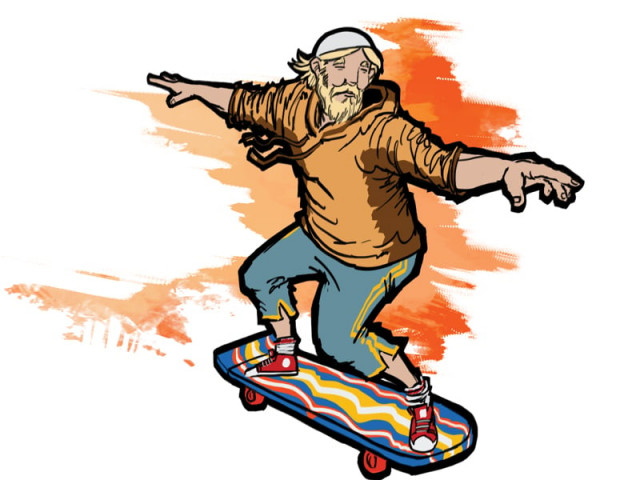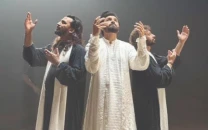Living by the book
As believers born into Muslim families, we often take many things about religion for granted.

The film, released in the summer of 2011 in California, is directed by Mustafa Davis and produced by Usama Canon, co-founder and founder of the Ta’leef Collective in California. So far, this film has been screened in various parts of the globe, including South East Asia, Canada and the United States.
The night started off with a series of short video clips titled Reflections, which Usama used to discuss the concept of the “third space.” He talked about how in our daily lives there were particular spaces — personal, sacred, public or non-religious — that we were accustomed to utilising. However, this “third space” is a space that can be used as anything that people need, without being pre-defined as religious, public, personal, etc. This space could be a place to meditate, to have coffee, to have a discussion or to hold a lecture, and is meant to help people reflect, relax and engage in some downtime with friends or by themselves. At first I was unsure of why the clips were being shown before the movie and what this discussion even meant, but it was more than clear after I watched the film.
With these ‘reflections’, the tone of the night was set. From the get go, the music, the cinematography, each shot and the use of photographs put you in the emotional place you needed to be in to fully understand this movie.
The documentary tells the story of Jordan Richter, born and raised in Florida, who had a troubled youth from the very beginning. Jordan’s parents abused drugs and could neither be the physical nor emotional support Jordan needed while growing up. Unable to cope with the situation at home, Jordan dropped out of the ninth grade and moved to San Diego.
In San Diego, Jordan met a man who made skateboards and through him discovered his love for the sport. By the time Jordan was 16, he had become a professional skateboarder. Skating with the likes of skateboarding stars such as Tony Hawk, Christian Hosoi, and Steve Caballero, Jordan won many amateur awards and was featured in major skater magazines. He ended up into hardcore drugs and was even considered mentally unwell for his use of acid, but he eventually got his act together. One day, he comes across a group of young Muslim men who introduce him to the mosque. Just two days after meeting them, Jordan converts to Islam.
He then talks about how after conversion, although everyone helped him in his Muslim community, he was thoroughly confused by the different and, at times, conflicting advice he’d receive. Being stripped of everything he knew before, Jordan attempted to follow Islam like his fellow Muslims did and along the journey felt that he had to end his skateboarding career.
Over the next 15 years, Jordan struggles to become a ‘good’ Muslim, constantly redefining himself to try to fit the mould of being the ‘best’ Muslim. He is almost like a fish out of water because he’s always afraid of doing something that is not in line with his new religion and, at the same time, missed the one thing he loved and felt most comfortable doing: skateboarding. After all those long years, however, Jordan eventually comes back to skateboarding and talks about how he is now attempting to make up for the lost time.
This was definitely not your typical ‘convert story,’ or at least not one I had ever heard. What struck me as I watched the film was that the problems Jordan faced were problems I never knew existed in the Muslim community. When you are born and raised Muslim, especially in the Islamic world, it is not very difficult to start taking religion or its rituals for granted and for accepting the religion and its limitations as you’ve been taught to practice. Sooner or later you feel that as a Muslim individual you definitively know what is ‘right’ and what is ‘wrong’ and you go about life, living within the boundaries you and your ‘people’ have created for you.
As I saw the film, I was touched by Jordan’s experiences and saddened by the fact that such a genuine and vulnerable person had gone through such hardship as a result of the same practices and ideals that I take for granted. Yet, while I could see Jordan’s pain, his faith in the religion and what he discovered to be an important part of what made him a whole person was inspiring.
I wasn’t alone, and others were as touched as I was. When the movie ended, a question-and-answer session with director Mustafa Davis, and producer Usama Canon, gave the audience a chance to reflect and reveal even more personal stories. One woman, who had converted to Islam 27 years ago, stood up and talked about how she gave up studio singing after she converted because she had been told that it was un-Islamic. An African-American man also stood up and talked about how at first he had thought he would not connect with a movie about a white man skateboarding, but then admitted that he was pleasantly surprised when he did. Another Muslim man stood up and even apologised for the pain he may have caused others by enforcing his views on them.
As people reflected on the film and their own experiences, I understood why Usama spoke about the “third space” before the film started. The “third space” was a space that Jordan could have used to talk about how he felt while on his journey. It could have been used as a platform for Jordan and his peers to discuss what he was comfortable and uncomfortable with. If Jordan was ever confused, the “third space” could have been used to help him clear up his confusion.
It was truly an eye-opening event. All in all, I was inspired and impressed by Mustafa for this brilliant film and artistic outlook, Usama for his welcoming and thought-provoking reflections, and Jordan for sharing his story and being so genuine. Through this film, these men managed to touch every single person in that room, regardless of race, culture, religion or past experiences.
Published in The Express Tribune, Sunday Magazine, July 8th, 2012.



















COMMENTS
Comments are moderated and generally will be posted if they are on-topic and not abusive.
For more information, please see our Comments FAQ